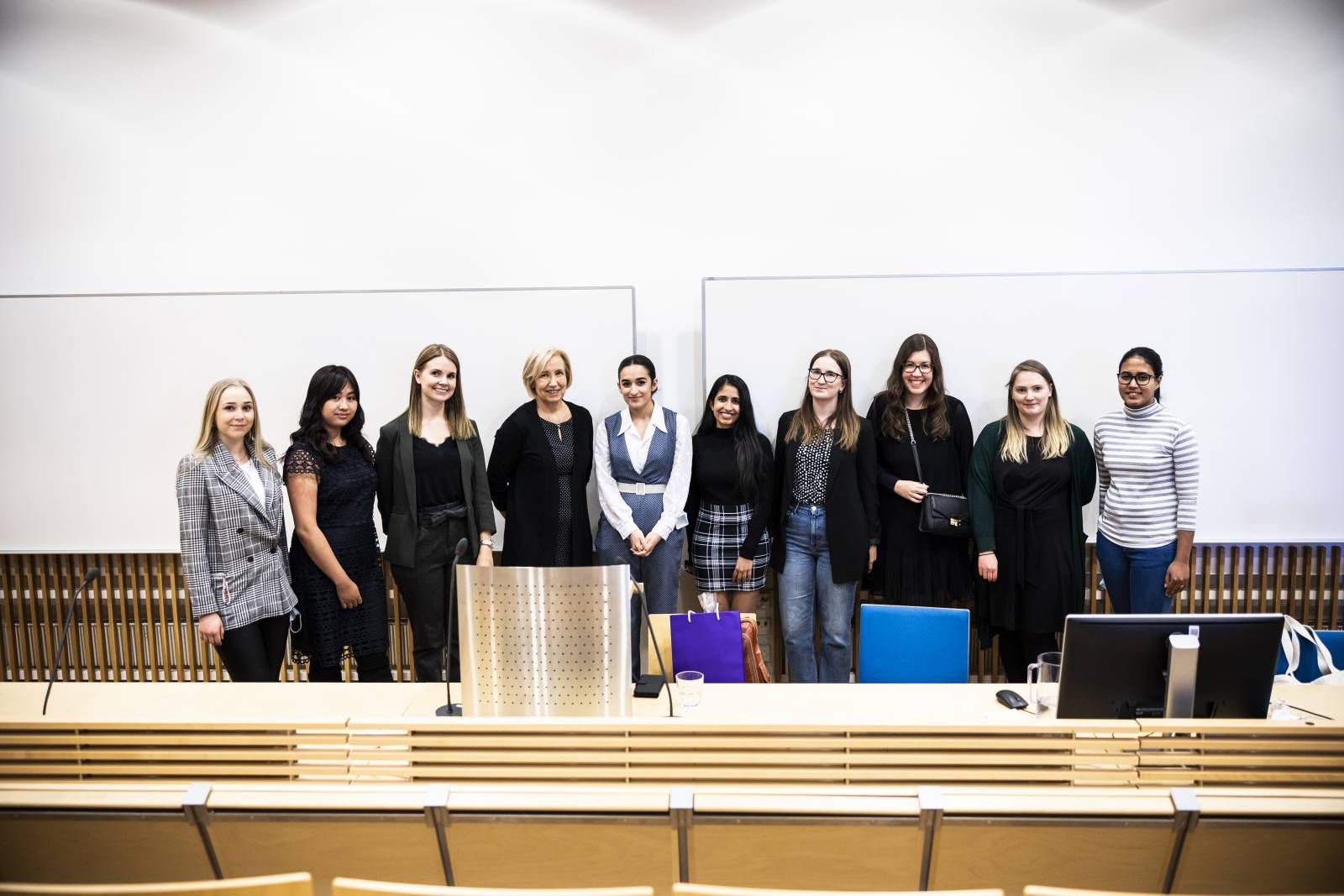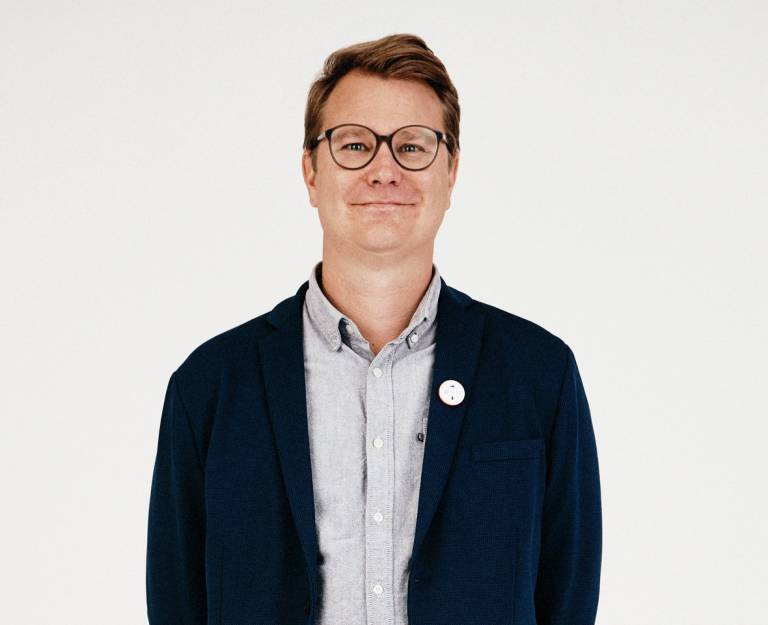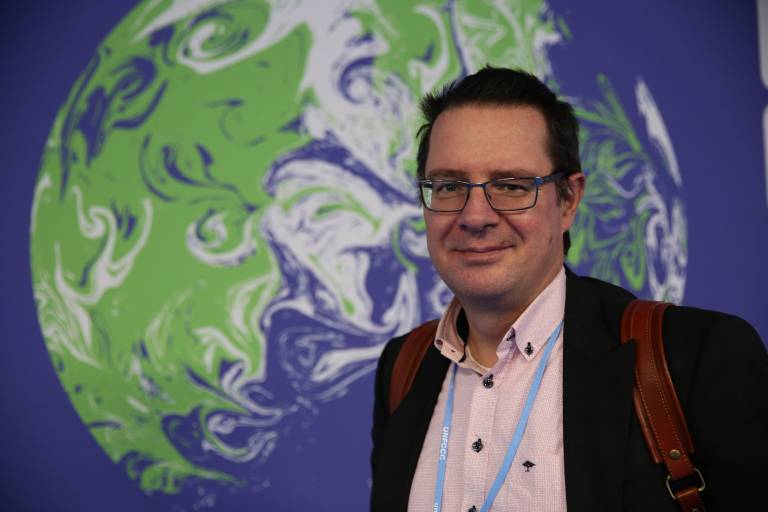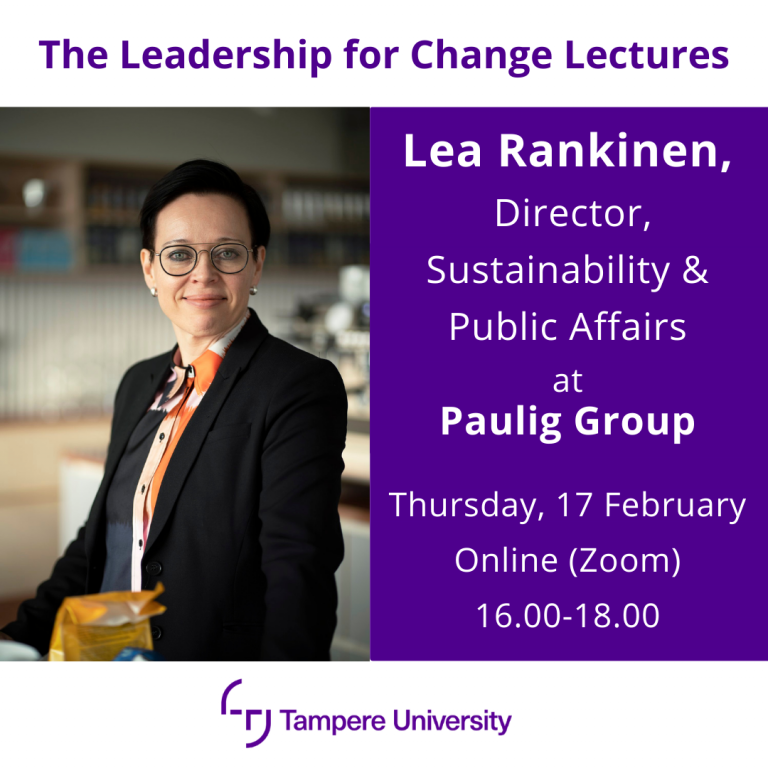In Sierra Leone, I visited a program where a partner of UNICEF was training youngsters in peer mentoring to talk about the importance of, for example, girls attending school and not marrying early, having the same possibilities as boys. It was a delightful experience seeing empowered young people talking about their future and what they want to achieve. I spoke to a young girl who was a part of the mentoring program for a while, and as adults often ask young people, I asked what she wanted to be when she grows up. I will never forget her answer. – “I want to be the first female president of Sierra Leone. I have seen what I can achieve within my own community, so imagine what I can achieve if I am the president.”
This is how Marja-Riitta Ketola, executive director of UNICEF Finland and the speaker of this year’s third Leadership for Change lecture, described an encounter she had in Sierra Leone as part of her important work. Ketola has been the executive director of the Finnish National Committee of UNICEF since the beginning of 2011. Previously, she has worked as Development Director at Finn Church Aid, and she was the first chief executive director officer of Plan International Finland. She also has several years’ experience in the corporate sector in marketing development and management positions in Finland, Germany, and the Netherlands.
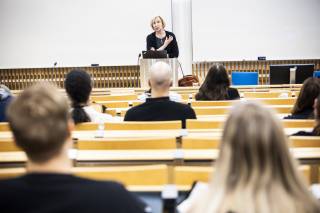 We had the pleasure of hosting Ketola at Tampere University as she delivered a lecture on the Challenges Facing Children’s Rights Following the COVID-19 Pandemic. In addition to the lecture topic, Ketola further incorporated information and insights about other recent challenges, such as the war in Ukraine. Sharing her thoughts, Ketola delivered an authentic and passionate lecture and encouraged the audience to engage and contribute with thoughts and questions.
We had the pleasure of hosting Ketola at Tampere University as she delivered a lecture on the Challenges Facing Children’s Rights Following the COVID-19 Pandemic. In addition to the lecture topic, Ketola further incorporated information and insights about other recent challenges, such as the war in Ukraine. Sharing her thoughts, Ketola delivered an authentic and passionate lecture and encouraged the audience to engage and contribute with thoughts and questions.
UNICEF is one of the most influential children’s organizations. It is present in over 190 countries and is prepared to operate in all countries of the world. The mandate of UNICEF comes from the UN Convention on the Rights of the Child (1989). The Convention states four principles: non-discrimination, best interests of the child, the right to survival and development, and the views of the child.
The only agenda is to work for the children
Every cloud has a silver lining. United Nations was born from the ashes of the World War II as the world was waking up to the costs of war and to the need for collaboration and brotherhood. Similarly, UNICEF was established after the World War II as the world realized that children were suffering the most. Ketola told the audience that she was touched by the history of the first executive director of UNICEF. The first executive director would only accept the position if the organization was prepared to help all children everywhere, no matter the country and its side during the war. UNICEF has never been a political organization. Instead, its only agenda is to work for the children. “You won’t see us on barricades. You will see us in meeting rooms”, said Ketola.
Ketola explained that UNICEF’s main strategy is working with governments. To elaborate on how UNICEF works in collaboration with governments, Ketola spoke about the organization’s work in Rwanda. UNICEF has had a presence in Rwanda for many decades. Every five years, UNICEF drafts a new strategic plan to improve the situation of children. The government of Rwanda is expected to draft a strategic plan following the plan of UNICEF, to ensure progress is being made. Through strategic planning, even a poorer country can improve the situation of children through budgeting and allocating resources. Rwanda is also a good example of how sustainable development is considered within the efforts of UNICEF: the country will not be left dependent on foreign aid, but instead, the focus is on improving the infrastructures of the countries where UNICEF works.
Even if their work with governments is not always as successful as with Rwanda, UNICEF will still be present to try and improve children’s rights where improvement is needed. UNICEF has had a presence in Afghanistan for over 70 years now. In a challenging environment, the organization has achieved significant results, such as increasing the number of children attending school. Even though the work is not easy, UNICEF maintains its presence and is negotiating with the regime in power to ensure the protection of children and their rights, such as allowing girls to get an education.
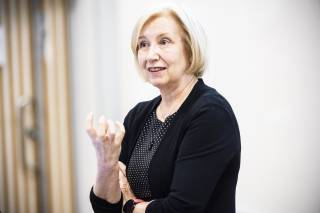 When asked if the work ever gets tiresome or too difficult, Ketola states that history has shown that improvements can be made and that she trusts in the process. She goes on to say that, of course, the madness of the world still sometimes surprises her. One of these instances was when she visited a refugee camp in Lebanon four years into the crisis in Syria, seeing the displaced children that had fled from Syria. “I said earlier that every cloud has a silver lining and that there is light at the end of the tunnel, but that was tough. The circumstances were very difficult.”
When asked if the work ever gets tiresome or too difficult, Ketola states that history has shown that improvements can be made and that she trusts in the process. She goes on to say that, of course, the madness of the world still sometimes surprises her. One of these instances was when she visited a refugee camp in Lebanon four years into the crisis in Syria, seeing the displaced children that had fled from Syria. “I said earlier that every cloud has a silver lining and that there is light at the end of the tunnel, but that was tough. The circumstances were very difficult.”
Do we need a crisis to start thinking about the rights of children?
Every minute, 90 children are fleeing the conflict currently taking place in Ukraine. UNICEF Finland, among other Finnish non-governmental organizations, is negotiating with Finnish ministries about the best ways for Finland to provide support to refugees fleeing from Ukraine – many of them being mothers with small children. Everyone agrees that children need to be protected during the crisis, and their rights and well-being must be ensured.
The crisis in Ukraine has opened the eyes of the Finnish people, including the corporate sector, and Ketola is amazed by their generosity. A possible explanation for why UNICEF is receiving numerous donations to be directed to Ukraine is the proximity of the crisis. It can be easier to sympathize when a crisis is happening close by and has a big presence in the media.
Ketola prompted us to think if war or conflict is needed to pay attention to the rights of children. Ketola left the audience with questions and a lot to think about: Why has UNICEF not been able to reach the same scale of donations before, even though there have been numerous crises before the one in Ukraine? What could UNICEF do differently to make sure that society pays attention to the rights of children without a war or a crisis?
COVID 19 pandemic redefining childhood
No matter what the crisis is, be it a war or a pandemic, children are often the worst affected. The pandemic has created an unprecedented situation where children have been especially impacted in numerous ways. Ketola reiterated how the pandemic is not just a health threat, but also how it has redefined childhood for children worldwide. Years of work by organizations like UNICEF to reach out to vulnerable children seems to be at stake due to the pandemic. Even before the pandemic began, one area that UNICEF laid its focus on was vaccinating children. During the pandemic, the focus has mainly been on distributing vaccines for COVID 19, especially in poor countries. Apart from the health aspect, the social and economic implications of the COVID 19 pandemic need to be addressed as well.
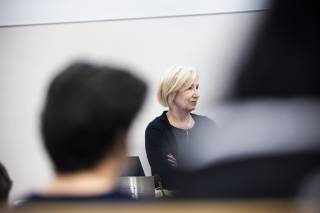 The COVID 19 virus did not differentiate between borders, social status, or race, and its aftereffects were not different either. Even the children in the happiest country in the world, Finland, face mental health issues inflicted by the pandemic. Ketola encourages us to think about the influence media has had on children and their mental health. In developing countries, the situation has been worse. Child labor, domestic violence, child marriages, and child abuse showed a steep increase in the past two years. Since many families lost their source of income during the pandemic, this has forced a lot of children to enter poverty which in turn has resulted in increased rates of malnutrition.
The COVID 19 virus did not differentiate between borders, social status, or race, and its aftereffects were not different either. Even the children in the happiest country in the world, Finland, face mental health issues inflicted by the pandemic. Ketola encourages us to think about the influence media has had on children and their mental health. In developing countries, the situation has been worse. Child labor, domestic violence, child marriages, and child abuse showed a steep increase in the past two years. Since many families lost their source of income during the pandemic, this has forced a lot of children to enter poverty which in turn has resulted in increased rates of malnutrition.
Education was affected the most. The number of children receiving basic education has been reduced and the quality of education suffers as well. For most of these children going back to school remains a question mark. Throughout the pandemic, UNICEF has worked ardently yet the results of their work have been hard to measure. “The beautiful figures about the progress that I showed you earlier, let’s wait a few years and see what an impact covid has” said Ketola. Though there’s hope for a global strategy to overcome this difficult situation, the work done by local governments is crucial. Along with their effort to empower children, UNICEF collects a wide variety of data that could be useful to the governments to bring about changes. The research center in Italy has been the backbone for data collection and research for decades. UNICEF also works with universities and academics to gather data that is vital to building a safe and secure future for children all around the world.
Amidst the challenges the future remains hopeful
A crisis is an ideal time to display teamwork. UNICEF’s contributions focus on education, nutrition, protection, water, sanitation and hygiene. Risk evaluation is done in every country to prepare better for any disaster or emergency. Ketola recalled an incident where a colleague of hers was leading the disaster management team during the Nepal earthquake in 2015. The team could perform better because it was equipped to face a disaster of such large-scale intensity. It is this sort of preparedness that helped UNICEF to work well in Ukraine as well. Supplies were stored in warehouses anticipating the current situation.
When asked about the nuances of her stressful job Ketola gave all the credit to her team, “the hard work is done by the team, and I am privileged to work with my colleagues” reenforced Ketola. As students of the Leadership for Change program, it was a food for thought moment for the audience as well, how it is not always about leading the way but also about trusting the team. As the team leader of an organization like UNICEF, it has been a tough two years during the pandemic for Ketola. However, it is the people with whom she works that make all the difference. Along with the grit and perseverance of her team, there is one more aspect that gives her confidence to pave the way. It is the hope she sees in the eyes of the children she works with. “I see hope, but the hope does not lie in me or the organizations, the hope lies in the youth and children”. From the teenage girl is Sierra Leon, who wants to become the first female president of the country to children fleeing their homes in Syria and Ukraine due to war, Ketola strongly believes there is still hope to build a better world for the future generation where every child has a pathway to possibilities.
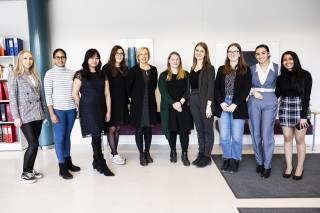
This LFC Lecture was organized by Iida Ansamaa, Khanum Gevorgyan, Julia Holme, Mharjurie Malaluan, Haritha Mukundan, Maria Mäkelä, Rebekka Rautiainen, Nora-Emilia Shigweda and Weenavi Sulakkana.
Photos by Jonne Renvall.


